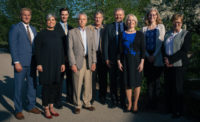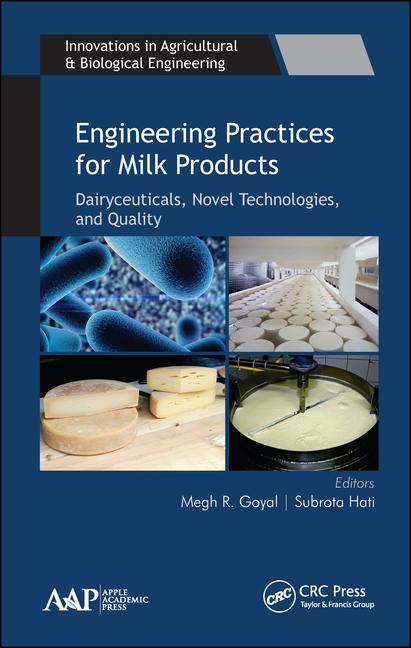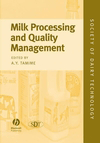Innovation Center for U.S. Dairy honors businesses, farms for sustainable practices
Award winners represent U.S. dairy’s commitment to sustainability.

Winners of the eighth annual U.S. Dairy Sustainability Awards announced by the Innovation Center for U.S. Dairy are, front row, l to r: Kathryn Cardoza (Philip Verwey Farms), Shelley Verwey (Philip Verwey Farms), Joan Maxwell (Cinnamon Ridge Farms), Cortney VanOeffelen (VanOeffelen Farm Services), Dean Strauss (Majestic Crossing Dairy), Nicole Zammit (Gleaners Community Food Bank); back row, l to r: Frank Cardoza (Philip Verwey Farms), Philip Verwey (Philip Verwey Farms), John Maxwell (Cinnamon Ridge Farms), Craig Metz (EnSave Inc.), Kevin O’Donnell (General Mills), Josh Luth (Foremost Farms), Kris Strauss (Majestic Crossing Dairy), Bridget Brown (Gleaners Community Food Bank), Stacy Averill (Gleaners Community Food Bank) and Julie Beamer (Gleaners Community Food Bank).
The Innovation Center for U.S. Dairy, established under the leadership of dairy farmers and leading companies, announced its eighth annual U.S. Dairy Sustainability Award winners during a May 8 ceremony in Rosemont, Ill.
The program recognizes dairy farms, businesses and partnerships with practices that improve the wellbeing of people, animals and the planet, said the Innovation Center for U.S. Dairy. Award winners represent U.S. dairy’s commitment to sustainability, demonstrating how transparency and ingenuity lead to sustainable and scalable practices that benefit their businesses, communities and the environment.
“This year’s winners show how innovation and creativity sparked by one farm, one person or one organization can have a ripple effect that goes well beyond their farmgate or front door,” said Barb O’Brien, president of the Innovation Center for U.S. Dairy. “Each winner exemplifies our industry’s values. They demonstrate that caring for the environment, our cows and our communities is our heritage and what we stand for every day.”
Through creative problem-solving, this year’s winners addressed environmentally beneficial production practices, resource and energy reduction and the essential role of dairy in bringing quality nutrition to food insecure populations. Judges evaluated nominations based on their economic, environmental and community impact. The independent judging panel — including leading dairy conservation and commercial experts — also considered innovation, scalability and replicability, the Innovation Center for U.S. Dairy noted.
“This program and these winners show there are no limitations to dairy ingenuity,” said Marilyn Hershey, Pennsylvania dairy farmer and chair of the Dairy Management Inc. board of directors. “Our commitment to sustainable practices shines through from the farm across the value chain. These are the stories that are important to today’s consumer and matter to the future of our industry.”
The 2019 U.S. Dairy Sustainability Awards winners are:
Outstanding Dairy Supply Chain Collaboration
General Mills and Foremost Farms (Reed City, Mich.)
To reduce greenhouse gas emissions (GHG) and add environmental benefits, General Mills and Foremost Farms USA convened a powerful network of 16 dairy farmers and other experts to assess and implement improvements using a science-based on-farm assessment tool to provide a comprehensive estimate of a farm’s GHG emissions and energy use. Participating farms saw a combined 11% reduction in GHG over a three-year period, which outperformed the national and regional benchmark averages. The FARM Environmental Stewardship module is helping farmers across America improve efficiencies, reduce costs and track their performance against environmental goals.
Outstanding Dairy Farm Sustainability
Cinnamon Ridge Farms (Donahue, Iowa)
Cinnamon Ridge Farms owner John Maxwell found an economic and environmentally sustainable solution to sourcing cow feed early in his career by planting a cover crop during the winter season. The crop, rye grass, survived harsh growing conditions while being great nutrition for his cows. The cover crop prevents nutrient runoff and erosion, building healthier soil for corn or soybean crops. The farm also became a destination for food waste, accepting 2,000 pounds of coffee creamer from a manufacturing company each week instead of ending up in a landfill. The creamer provides a carbohydrate source for the cows’ diet with added flavor.
Majestic Crossing Dairy (Sheboygan Falls, Wis.)
The 2,000 cows at Majestic Crossing Dairy are the result of a unique strategic shift when co-owner Dean Strauss began building a herd of crossbreeds. The cows tend to be smaller in size, requiring less food and producing less manure. Strauss has adopted a GPS guidance system on his tractors and other machinery that helps identify efficiencies in seed distribution, as well as reduce fuel, pesticide and fertilizer use on the 3,600 acres of crops grown to feed the cows. Majestic Crossing also invested in robotic milking machines that have reduced his farm’s water use by 30%, or about 20 gallons per cow each day.
Philip Verwey Farms (Hanford, Calif.)
Philip Verwey had a notion to implement changes on his 9,000-cow Philip Verwey Farms to help improve air quality. His idea: Rather than blending feed ingredients for his cows in a mixing wagon powered by a diesel tractor, he would blend using an electric stationary mixer. He applied for funding through the San Joaquin Valley Air Pollution Control District’s Technology Advancement Program to help convert his feed-mixing program. The changes cut his dairy’s tractor-related emissions substantially, the equivalent of taking 7,800 cars off the road. His success led to an expanded program and inspired other farms to apply for funding.
Outstanding Community Impact
Gleaners Community Food Bank (Detroit)
Gleaners Community Food Bank, which serves the emergency food network in southeastern Michigan, ensured more clients will have access to fresh, nutritious milk by partnering with the dairy community. Together, they established a fundraising campaign that’s built to last, and they mastered the logistical challenge of getting refrigerated milk to families in need — with the help of a mobile food pantry and an improved distribution model. In 2018, they successfully provided 229,000 gallons of milk to those in need.
The U.S. Dairy Sustainability Awards program is supported by generous sponsors, the Innovation Center for U.S. Dairy said. This year’s sponsors are: DeLaval, Phibro Animal Health, Syngenta, USDA and World Wildlife Fund.
Looking for a reprint of this article?
From high-res PDFs to custom plaques, order your copy today!








